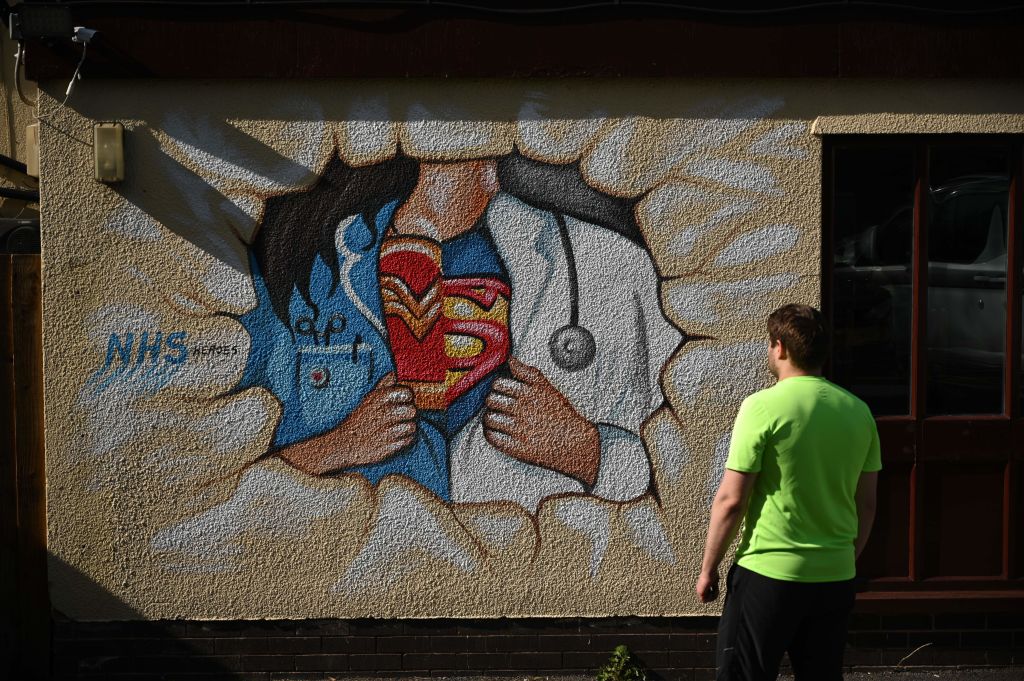The British National Health Service has rightly been praised for its response to coronavirus. But it still isn’t quite the model of efficiency it could be. And there remains a problem with how UK medical bureaucracy is handling the treatment of hospitalized COVID patients.
Hard-pressed consultants are reportedly being forced to swap news in WhatsApp groups about possible cutting-edge treatments. These doctors are desperate for information which may help their COVID patients in hospital either stay out of intensive care or, if unlucky enough to be in ICU, improve the 50/50 odds of life or death once on ventilation. Why? It seems likely that doctors are forced to innovate off the record because of the bureaucracies we’re all too often lumbered with in the medical world. Public Health England and Britain’s other stifling quangos are too process-driven and all-too-often too risk-averse to be able to respond to the nimbleness being shown by consultants at the top of their game across the world, who are willing to dare all and do everything possible to try and save patients’ lives.
When this is all over, one clear lesson is that we must return the NHS to control by medical consultants and old-fashioned matrons, as it used to be, with administrators in their proper place to take — not to give — orders.
The basic facts about coronavirus should make this abundantly clear. Why? Because the victim of this disease does not die from the virus but from the body’s over-stimulated reaction to COVID-19: a ‘cytokine storm’. This is an autoimmune crisis triggered in the lower lungs by the virus that has infected the upper respiratory tract. So once a patient is hospitalized, the key objective on admission must be to stop the slide into that ‘cytokine storm’ by all means necessary.
The good news is that it seems conservative treatment by oxygen and ventilation and organ support is not all that can be done to support the immune system to fight back. There are various options here for a doctor to experiment with. First comes Vitamin D. Studies in cancer patients treated with Immunotherapy has revealed a remarkable association here. Patients with low levels of vitamin D3 do not respond well. And by correcting such low levels, it greatly improves the chances of responding and survival. Indeed, across different cancer types and treatments, correcting a low vitamin D3 level at the time of cancer diagnosis can improve outcome and survival at a rate nearly twice that of Tamoxifen on breast cancer. Could the same apply for those struck down with coronavirus?
Second, a research program under professor Cecilia Söderburg-Naucler at the Karolinska Institute in Stockholm, soon to be published, has suggested that another virus – herpes 5, or CMV, which is dormant in the lungs of very many of us, can be ‘woken up’ by COVID infection in order to boost it. The study indicates that early use of a safe and common drug which can successfully treat herpes may help stop that fatal slide into the cytokine storm. In the UK population it infects less than four per cent of young people but rises to over 65 percent in the elderly. Significantly, CMV rates are markedly higher in Black and minority ethnic (BAME) populations. Acyclovir is cheap and without significant side effects. It should be top of the list to be considered in COVID-19 patients, especially BAME patients, who appear to be affected by this virus disproportionately, as first line to see if it can stop progression from early symptoms to fatal complications.
Third, another more recent realization is that COVID-19 is using ‘bitter/sweet receptors’ to enter the upper lungs (loss of taste is a commonly reported early symptom). Once the virus gets a grip in the lower lungs, in order to proliferate it needs energy: glucose. So starve it. During the pandemic there has been some clinical success in these moderately advanced patients in administering Metformin, a common glucose-blocking drug used in diabetes treatment, along with a high-fat diet. Again, it’s worth asking whether this is an avenue that needs further exploration.
Fourth, clinical friends of mine fighting the Italian pandemic have made a discovery which seems to be the only one that really helps for those who have progressed to ventilation. Once in a developing cytokine storm, it is vital to block the IL-6 receptor and this, they have found, can be done by re-purposing the monoclonal antibody anti-rheumatoid arthritis drug tocilizumab. This is a superb example of re purposing already available drugs.
Fifth, we have heard that a drug used to fight ebola also seems to be showing effectiveness in the battle against coronavirus. This has been disputed but it is an avenue worth investigating. Other agents including antibiotics are also being associated with unexpected benefit, perhaps having unintended anti-viral activity. We need to collect and monitor all this information to underpin the rationale for clinical trials. But is the NHS up to the job of doing so?
***
Get three months’ free access to The Spectator USA website —
then just $3.99/month. Subscribe here
***
There are so many potential simple possibilities to improve the fight against this dreadful virus that can be done without waiting for official approval. I was recently reminded of a patient on ITU when I was a registrar who was in a coma and would not respond to all conventional treatments. I remembered that this occurred in a rare condition associated with a severe thiamine deficiency. My boss said there was nothing to lose and I gave him a big intravenous injection. The result? He woke up and was discharged the next day. In the current climate I would almost certainly not be allowed to do this as there is no protocol or proof as red tape demands, and the patient would have died, but at least no rules would have been broken. It is time we returned to this type of front-line thinking in these challenging times — and allowed doctors to put their knowledge to full use.
Angus Dalgleish is professor of Oncology at St George’s University of London and a Fellow at the Centre for Brexit Policy. This article was originally published on The Spectator’s UK website.

























